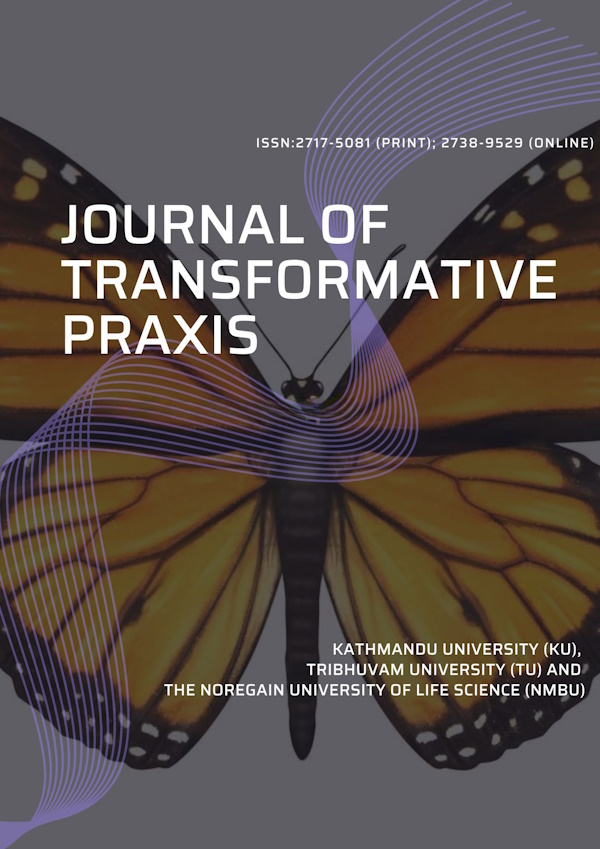
Journal of Transformative Praxis, Volume 1, Issue 1, 2020, 50-60, https://doi.org/10.3126/jrtp.v1i1.31760
Online publication date: Jun 30, 2020
Publication date: Dec 31, 2020
Views: 771 | Downloads: 277
Reference: Luitel, L. (2020). Moments of Critical Self-reflection of a Transformative Mathematics Teacher. Journal of Transformative Praxis, 1(1), 50-60. https://doi.org/10.3126/jrtp.v1i1.31760
Reference: Luitel L. Moments of Critical Self-reflection of a Transformative Mathematics Teacher. Journal of Transformative Praxis. 2020;1(1):50-60. https://doi.org/10.3126/jrtp.v1i1.31760
Reference: Luitel L. Moments of Critical Self-reflection of a Transformative Mathematics Teacher. Journal of Transformative Praxis. 2020;1(1), 50-60. https://doi.org/10.3126/jrtp.v1i1.31760
Reference: Luitel, Laxman. "Moments of Critical Self-reflection of a Transformative Mathematics Teacher". Journal of Transformative Praxis 2020 1 no. 1 (2020): 50-60. https://doi.org/10.3126/jrtp.v1i1.31760
Reference: Luitel, L. (2020). Moments of Critical Self-reflection of a Transformative Mathematics Teacher. Journal of Transformative Praxis, 1(1), pp. 50-60. https://doi.org/10.3126/jrtp.v1i1.31760
Reference: Luitel, Laxman "Moments of Critical Self-reflection of a Transformative Mathematics Teacher". Journal of Transformative Praxis, vol. 1, no. 1, 2020, pp. 50-60. https://doi.org/10.3126/jrtp.v1i1.31760
- Adams, T. E., Jones, S. L. H., & Ellis, C. (2015). Autoethnography. Understanding Qualitative Research. Oxford university press.
- Brown, E. J. (2013). Models of transformative learning for social justice: comparative case studies of non-formal development education in Britain and Spain. Compare: A Journal of Comparative and International Education, 45(1), 141-162.
- Ellis, C. (2017). Manifesting compassionate autoethnographic research. International Review of Qualitative Research, 10(1), 54-61.
- Fraser, S. P., & Bosanquet, A. M. (2006). The curriculum? That’s just a unit outline, isn’t it? Studies in Higher Education, 31(03), 269-284.
- Freire, P. (1993). Pedagogy of the oppressed. New York, NY: Continuum
- Grundy, S. (1987). Curriculum: Product or praxis? London, England: Falmer Press.
- Hua, Z. (2015). On teacher development. In Z. Hua & W. F. Pinar (Eds.), Autobiography and teacher development in China: Subjectivity and culture in curriculum reform (pp. 48-68). New York, NY: Macmillan.
- Lerman, S. (1990). Alternative perspectives of the nature of mathematics and their influence on the teaching of mathematics. British Educational Research Journal, 16(1), 53-61.
- Liu, K. (2013). Critical reflection as a framework for transformative learning in teacher education. Educational Review, 67(2), 135-157.
- Luitel, B. C. (2003). Narrative explorations of Nepali mathematics curriculum landscapes: An epic journey Unpublished Master's Project, Curtin University of Technology, Perth.
- Luitel, B. C. (2018). A mindful inquiry towards transformative curriculum vision for inclusive mathematics education. Learning: Research and Practice, 4(1), 78-90.
- Luitel, B.C. (2013). Mathematics as an im/pure knowledge system: Symbiosis (w)holism and synergy in mathematics education. International Journal of Science and Mathematics Education 10(6),65-87. https://doi.org/10.1007/s10763-012-9366-8
- Luitel, L. (2020). A journey through different images of mathematics curriculum and their pedagogical implications: An autoethnographic inquiry (Unpublished MPhil dissertation). School of Education, Kathmandu University, Lalitpur, Nepal.
- Luitel, L., & Pant, B. P. (2019). Images of the mathematics curriculum held by school mathematics teachers: Mapping the road for transformative pedagogies. In Y. Rahmawati & P. C. Taylor (Eds.), Empowering science and mathematics for global competitiveness (pp. 510-516). London, England: Taylor and Francis.
- Macintyre, T., & Hamilton, S. (2010). Mathematics learners and mathematics textbooks: A question of identity? Whose curriculum? Whose mathematics? The Curriculum Journal, 21(1), 3-23.
- Mariana, N. (2017). Transforming mathematics problems in Indonesian primary schools by embedding Islamic and Indonesian context (Unpublished doctoral thesis). School of Education, Murdoch University, Australia.
- Mezirow, J. (2003). Transformative learning as discourse. Journal of transformative education, 1(1), 58-63.
- Pant, B. P. (2019). An integral perspective on research: Methodological and theoretical journey of a teacher educator. In P. C. Taylor & B. C. Luitel (Eds.), Research as transformative learning for sustainable futures: Global voices and visions (pp.75- 87). Leiden, The Netherlands: Brill Sense.
- Pinar, W. F. (2004). What is Curriculum Theory? New Jersey: Lawrence Erlbaum.
- Rahmawati, Y., & Taylor, P. C. (2015). Moments of critical realization and appreciation: A transformative chemistry teacher reflects. Reflective Practice, 16(1), 31-42.
- Schubert, W. H. (1986). The curriculum: Perspective, paradigm and possibility. New York, NY: Macmillan.
- Shrestha, I. M. (2019). Facilitating culturally de/contextualised mathematics education: An arts-based ethnodrama. In P. C. Taylor & B. C. Luitel (Eds.), Research as transformative learning for sustainable futures: Global voices and visions (pp.225 - 238). Leiden, The Netherlands: Brill Sense.
- Taylor, P. C. (2008). Multi-paradigmatic research design spaces for cultural studies researchers embodying postcolonial theorising. Culture Studies of Science Education, 3(4), 881–890.
- Taylor, P. C., & Settlemaier, E. (2003). Critical autobiographical research for science educators. Journal of Science Education, 27(4), 233-244.
- Tutak, F. A., Bondy, E., & Adams, T. L. (2011). Critical pedagogy for critical mathematics education. International Journal of Mathematical Education in Science and Technology, 42(1), 65-74. https://doi.org/10.1080/0020739X.2010.510221
- Wagle, S. K., Luitel, B. C., & Krogh, E. (2019). Irrelevance of basic school education in Nepal: An anti-colonial critique on problems and practice. Dhaulagiri Journal of Sociology and Anthropology, 13, 31-39.
I would like to thank all the reviewers of my paper. It would not have been possible to bring the paper in this form without their valuable comments and suggestions. Moreover, my sincere thanks go to the language editor who spent significant time and put efforts to avoid language error(s). Last but not least, thanks go to all who always encouraged and empowered me to be involved in academia.
This work is licensed under a Creative Commons Attribution-ShareAlike 4.0 International License.
